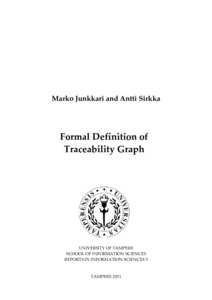Formal Definition of Traceability Graph
Junkkari, Marko; Sirkka, Antti (2011)
Junkkari, Marko
Sirkka, Antti
Tampereen yliopisto
2011
Informaatiotieteiden yksikkö - School of Information Sciences
This publication is copyrighted. You may download, display and print it for Your own personal use. Commercial use is prohibited.
Julkaisun pysyvä osoite on
https://urn.fi/urn:isbn:978-951-44-8652-4
https://urn.fi/urn:isbn:978-951-44-8652-4
Tiivistelmä
Data-centric workflows focus on how the data is transferred between processes and how it is logically stored. In addition to traditional workflow analysis, these can be applied to monitoring, tracing, and analyzing data in processes and their mutual relationships. In many applications, e.g. manufacturing, the tracing
of products thorough entire lifecycle is becoming more and more important. In the present paper we define the traceability graph that involves a framework for data that adapts to different levels of precision of tracing. Advanced analyzing requires modeling of data in processes and methods for accumulating resources and emissions thorough the lifecycle of products. The traceability graph enables tracing and accumulation of resources, emissions and other information associated with products. The traceability graph is formally defined by set theory that is an established and exact specification method.
of products thorough entire lifecycle is becoming more and more important. In the present paper we define the traceability graph that involves a framework for data that adapts to different levels of precision of tracing. Advanced analyzing requires modeling of data in processes and methods for accumulating resources and emissions thorough the lifecycle of products. The traceability graph enables tracing and accumulation of resources, emissions and other information associated with products. The traceability graph is formally defined by set theory that is an established and exact specification method.
